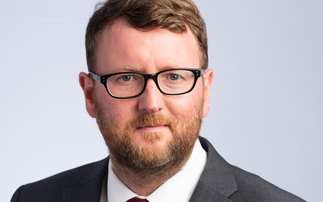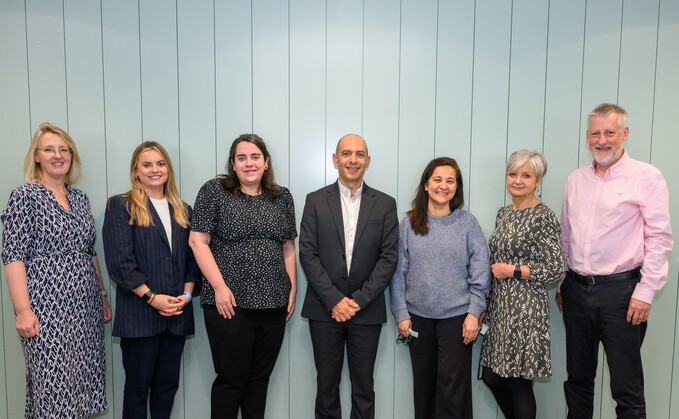
From left: XPS Pensions Group head of DC and SPP president Sophia Singleton; Professional Pensions news editor Holly Roach (chair); Pensions Policy Institute senior policy researcher Lauren Wilkinson; Columbia Threadneedle Investments client relationship director Andrew Brown; Law Debenture professional trustee Sonel Mehta; Smart Pension Master Trust trustee director and PASA chair Kim Gubler; and BESTrustees professional trustee Roger Breeden
In October, Professional Pensions assembled a panel of experts to look at the some of the issues raised in this year’s 10th anniversary DC Future Book, which was published by the Pensions Policy Institute in conjunction with Columbia Threadneedle Investments (CTI) in September.
The roundtable – chaired by PP news editor Holly Roach and held in association with CTI – looked back at what has been achieved in DC pensions over the past decade; the changes that have been seen in the market; and ask what is still left to do.
Among other things, it took a look at DC adequacy – asking whether future retirees will be able to accrue sufficient DC savings to achieve both an adequate and sustainable retirement income – and discussed whether auto-enrolment (AE) coverage is sufficient.
The 10th anniversary DC Future Book can be viewed here.
What are the highlights from this years' Future Book?
Lauren Wilkinson (Pensions Policy Institute): We have seen huge changes over the last 10 years since the first launch of the Future Book. Participation through AE has grown massively. Pension freedoms mean people's access to their savings has changed massively. The overarching theme is the shift of responsibility and risk from employers to individuals.
As we look ahead at the next decade, we need to extend AE to those who might not be included. We often hear that we do not need to worry about low earners because they will exceed their earnings with just the state pension. Saying that they have had low living standards during their working life does not mean that they should have the same during retirement.
The focus on pensions has been huge since the new government's Pensions Review. There is also the second phase around adequacy, which is a key concern for DC savers when looking at average contribution rates, which have stagnated around the mandated minimum under automatic enrolment. There is no sign that is increasing and will not without more government push.
Kim Gubler (Smart Pension Master Trust): We talk about not worrying about low earners, but it is not just that. That is assuming that a low earner will always be a low earner. Rather than pigeonhole people into low earning and say they should not contribute, consider if they did a bit and then their wealth increased in some way.
Lauren Wilkinson: We also tend to look at things on an individual basis rather than a household basis.
Sophia Singleton (XPS Pensions Group): Households change over time as does where income comes from. Also, divorce or separation is a massive factor as people get into the second half of their lives. That will be a big issue, particularly for women over 60.
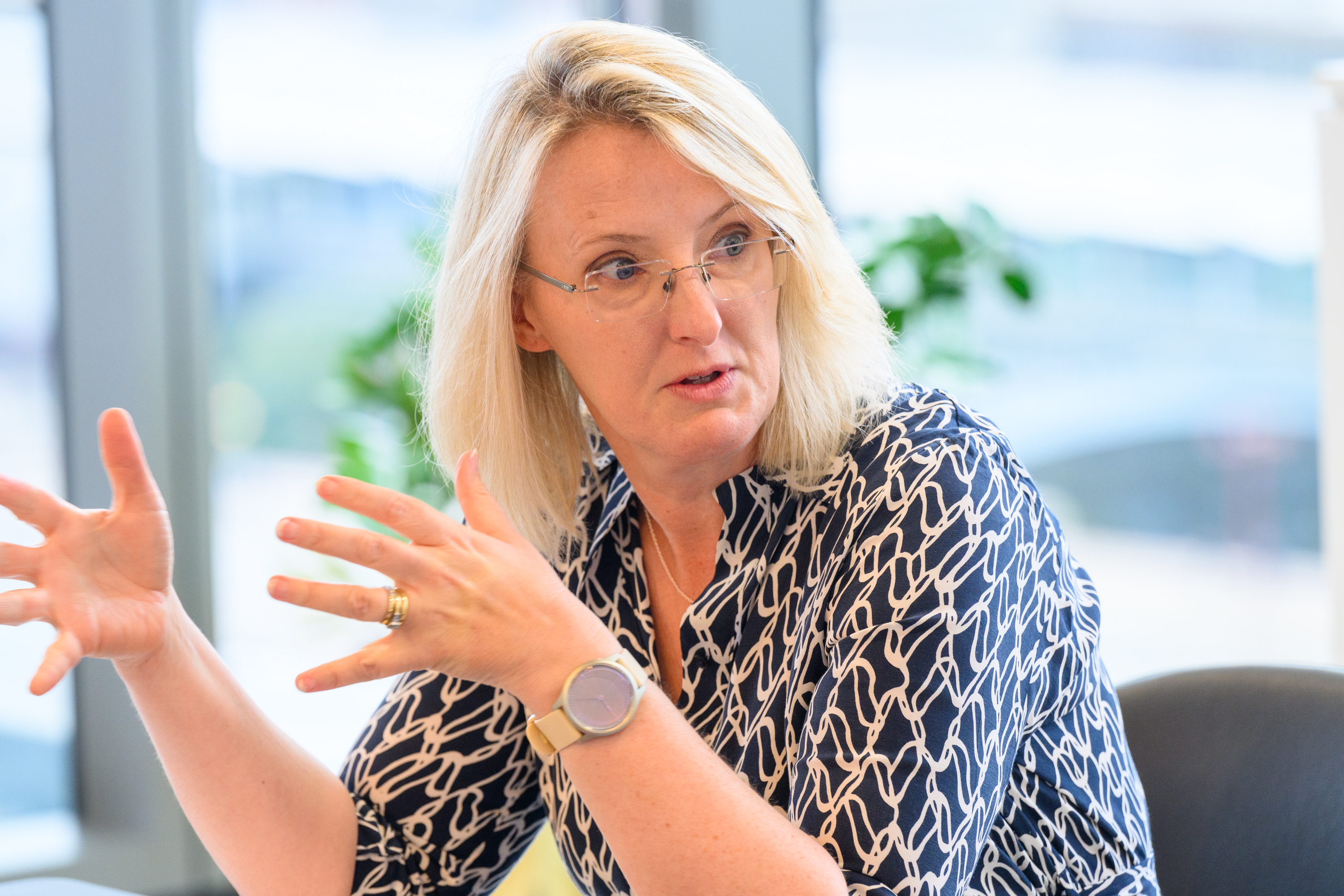
Sonel Mehta (Law Debenture): Part of this comes down to education. There is a lack of understanding of the value of pensions. When people are looking for different jobs, they only compare the salary instead of looking at the pension offering because they do not value it.
Andrew Brown (Columbia Threadneedle Investments): People have somewhat of a present bias, so they are more worried about today than the future. That can be understandable, particularly for younger or lower-paid workers who have pressures to save for a house deposit. That said, education is important. Relying on inertia is why automatic enrolment works. If people were having to opt in, we would have less desirable outcomes. Raising contribution rates to solve adequacy issues would be difficult to implement. It is part of the government's agenda, but it is very much secondary.
Kim Gubler: Many people assume they are paying enough. The literacy and numeracy average across the country is not terribly high. You are trying to talk to people about pensions when they do not know what a percentage is. That is not being condescending, it is saying it's root and branch. That needs to come from a governmental perspective in terms of financial literacy and trying to understand the value of money.
Sophia Singleton: There is a basic level of understanding and education that is needed from an early age, but we do have to rely on inertia because none of us know how to service our car and are never going to. We just know we have to service it.
We could get people into retirement with inertia, but we cannot suddenly learn how to service our car at 65. We must find ways of defaulting or guiding people to get to and through retirement.
Roger Breeden (BESTrustees): The whole crux of adequacy with DC is that it must be integrated into people's financial lives. DB could stand alone. DC has to be sitting inside someone's personal finances. There is an educational piece, but it is also that sense of ownership of the account. It is not someone else's money. It is the individual's money. That mindset is going to be a critical challenge.
Sonel Mehta: I like that car service analogy, but if we did not have to get the MOT done every year most people would not get it done that frequently. Again, it is the push by regulation that makes you do it.
Kim Gubler: We need to make the things that we want people to do easy and the things that we do not more difficult, so you guide them in the right direction. We have spent years talking about how to help people in that accumulation stage, and then when they are just on a precipice, they are told to do what they like. This is one of the reasons why people are maxing out their pots. It is not much of an issue now because they may have other DB but, as we go through to the next 20 years, we are going to be, apart from public sector and the odd CDC, DC only.
Andrew Brown: This is where inertia falls down. Once you get to decumulation, it is often too late to have the desired standard of living. That said, there are safeguards that we have introduced for those decumulating to ensure that they make more optimal decisions. There is a long way to go to have an accessible advice market.
There is an issue around guidance and advice. You should be able to phone your pension provider and get more than just signposting or guidance. They should be able to suggest an investment strategy that meets your needs, rather than guide you.
Sophia Singleton: The advice guidance framework is crucial. But I do not know when we are going to see anything on it.
Kim Gubler: The Retail Distribution Review broke advice. It meant there are fewer independent financial advisers (IFA) unless you have a good six figures.
Sonel Mehta: It is also expensive. An IFA can be £2-3,000. If you have that much money, you are probably au fait with finances. It is the ones who have the smaller pots who need that advice.
Lauren Wilkinson: Robo-advice and AI will make it more affordable and accessible for people. Work also needs to be done around helping people recognise the value. Sometimes it is excessive in terms of the cost, but many people are fully withdrawing their pots because they want a sense of ownership. They are paying more tax than if they had drawn it down more steadily. They could make back that money very quickly by speaking to an adviser.
Roger Breeden: There are systems out there that have algorithms. It is not full AI, but it is effectively algorithm delivered, allowing multiple scenarios to be analysed. This happens automatically but it would take an advisor months to do. You can look at so many more scenarios at a much lower cost point. We need to see more of that coming into the market.
Lauren Wilkinson: We also need to make sure that we are agile and quick enough in responding to changes in the broader landscape. AI is growing very quickly across other financial areas, whereas in pensions, we can have too much of a long-term view and act too slow. There is a risk that if we do not respond quickly enough to AI, some members might start utilising it themselves and not fully understanding the implications and risks of doing that. Whereas if we integrate it quickly, we could protect them.
Kim Gubler: With AI you have data analytics and the ability to hyper-personalise information to people and that is when they listen. People will take notice more if it is actually targeted at them.
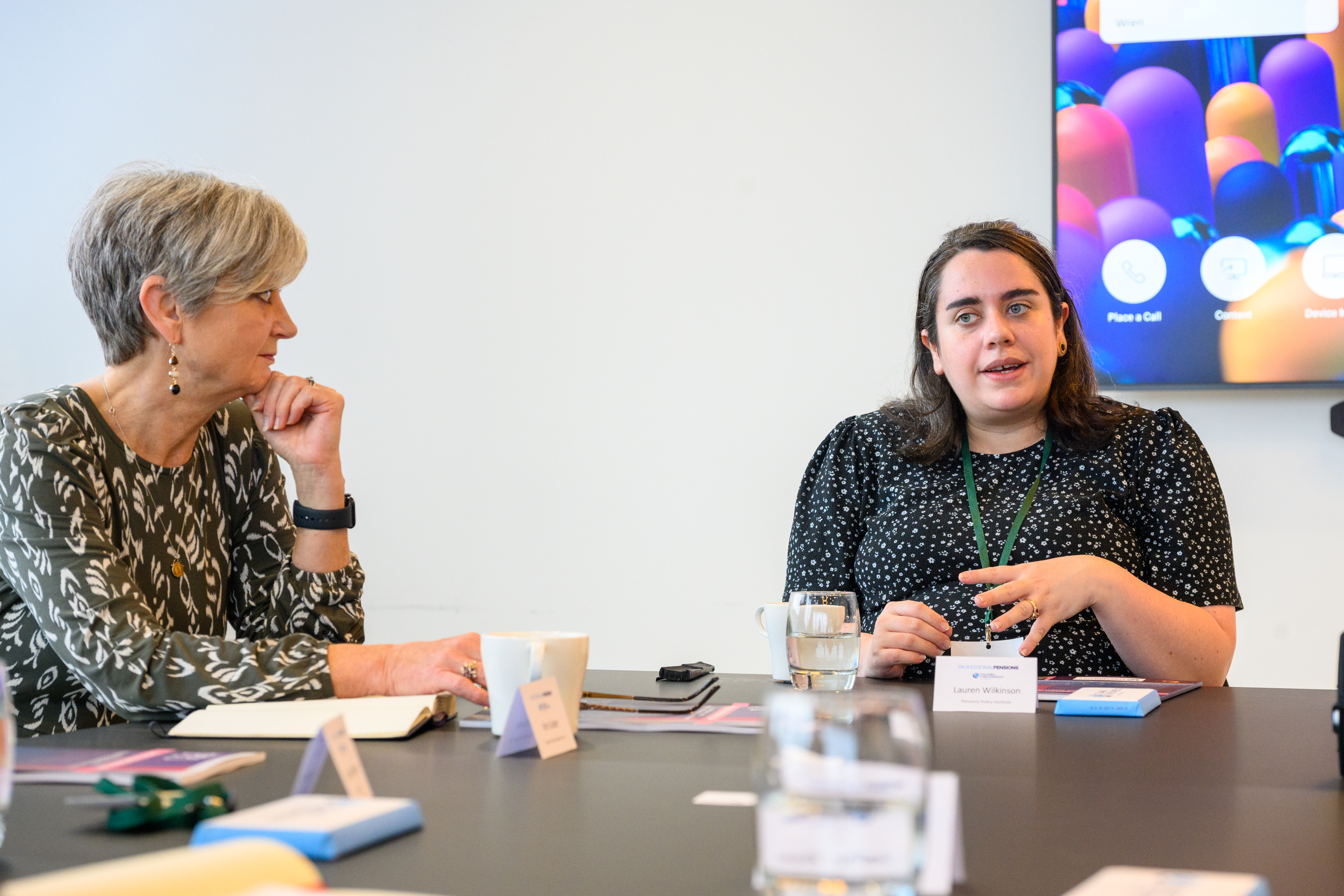
Are future retirees going to be able to afford to live in retirement comfortably? Is AE coverage sufficient? What levels do we need to get to?
Sophia Singleton: The question is what level is realistic. As an industry, we have all settled on 12%. Australia is getting to 12%. Their last step is next year, and they have taken 30 years to get there. We should not expect to get 12% contributions overnight, but we need a roadmap to get there. That might be half-percent increases over time with some guardrails based on economic situations, potentially to pause if we need to, but we need to have a plan.
Sonel Mehta: I like the idea of up to 20%. This is what employers paid for DB. We are giving them that same percentage, but with certainty that they will not have to pay more. There is no reason why 7% cannot go to 20%, but I think there can be guardrails for smaller businesses.
Andrew Brown: The key is having the roadmap. One of the issues is the amount of political change in the past 10 years. We need some stability in policymaking going forwards.
This is why you often get touted this idea of separate policy or a pensions commission, which sits adjacent to government and policy makers, so there is long-term policy in pensions.
Ultimately, something has to be done and time is pressing because at this rate a very significant proportion of people will be retiring below the Pensions and Lifetime Savings Association's (PLSA) minimum adequacy in retirement rate.
Roger Breeden: I think the data covers up quite a lot of averages as well. Most of us work with larger employers that have provided better contributions than a small company. You might run a small company, but you are virtually self-employed and running on marginal costs. We might be able to get it right for larger organisations, but it is the smaller companies and self-employed that policy needs to focus on.
Andrew Brown: This is where pensions need to be more flexible. We have 4.25 million self-employed people, very few of whom will have any pension provision.
For younger people, there is debt, but there is also saving towards a deposit for a house, which is the major challenge. There are pension systems globally that allow some flexibility to access your pension for that, or even use the pension as collateral.
Kim Gubler: I like the idea of collateral, because I do not like the idea of early access for pensions.
Sophia Singleton: I do worry about more flexibility with your pension. If you dip into your pension, it becomes a habit and you get holes in people's pensions where the under-savings amount is quite big.
Roger Breeden: In the US though, people have more of a sense of ownership and responsibility because they know it is down to them. Culturally here, we think someone else is going to do it for us.
Kim Gubler: We need to do something for the future because we have a lost generation. Something needs to come out of the pension review of adequacy next year and we need to be thinking of that roadmap.
Sophia Singleton: It needs to be a much more holistic look at adequacy and what is needed. Not everyone needs the 8%, even at 12%. There are so many different groups to look at. There are several pension gaps that need to be addressed. I would like the review to look at it as a whole, then come up with proposals and a roadmap that addresses getting the self-employed, getting up to 12% and closing gaps.
Sonel Mehta: There is a generation that will end up with not enough savings. They will be reliant on benefits, but we have an increasing dependency ratio, which means there will not be enough.
Lauren Wilkinson: For adequacy and engagement, we need cross-departmental and holistic thinking across the government. Too often we are focused on encouraging people to save specifically in a pension, whereas other types of long-term saving or purchasing a house can have a significant impact on retirement outcomes.
The industry itself should be more open. There are lessons that we could learn from other aspects of financial services, where they have solved some of the challenges we are facing now.
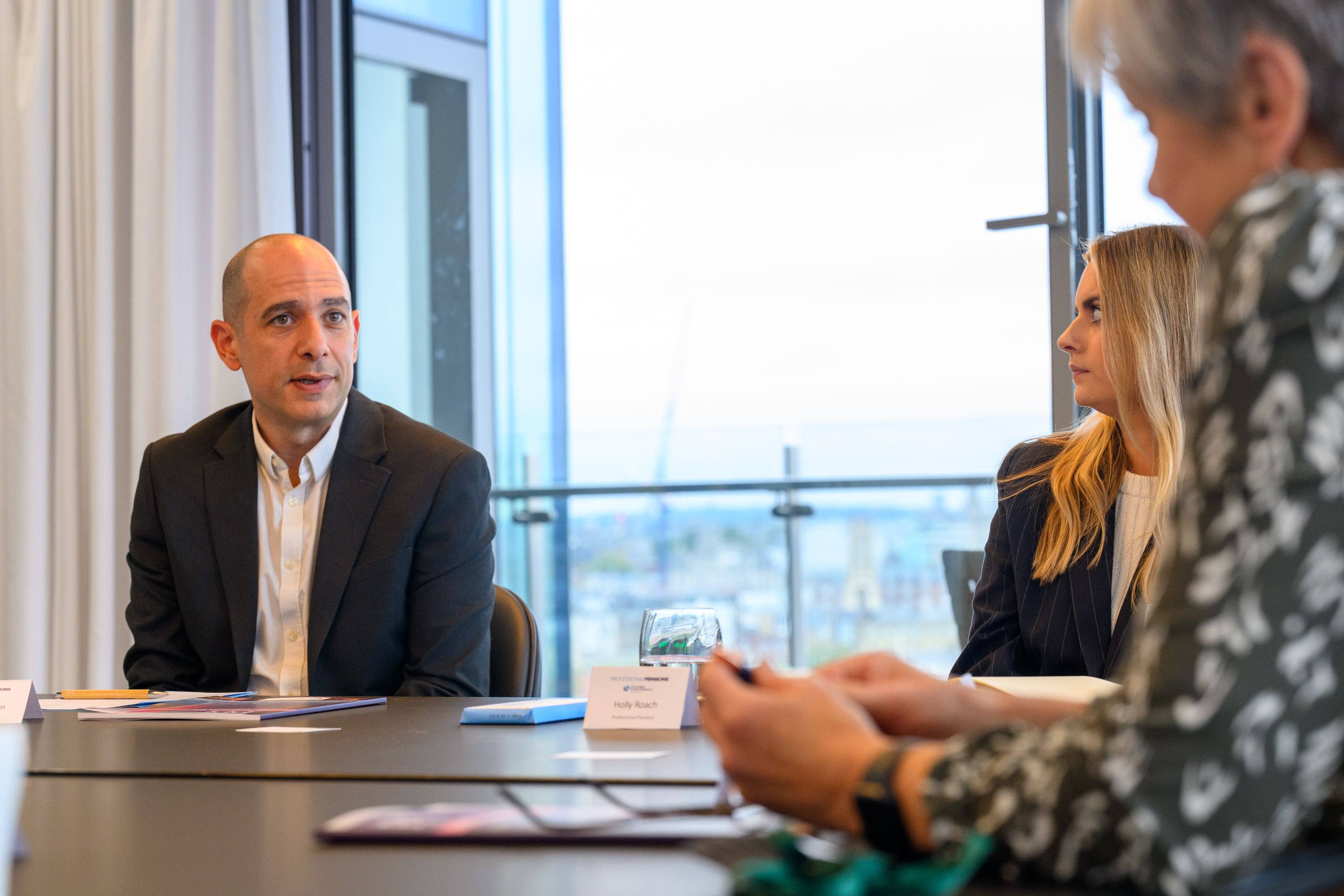
What do you expect in the next 10 years for DC?
Sonel Mehta: We will see progress with dashboards and more ownership as people consolidate their pots and it becomes "my pot of money" as it grows to a larger amount. Further improvement, however, will only come if we see political stability and politicians taking their hands off pensions and forming an independent pensions commission.
Andrew Brown: Although there is much to be done, look at the achievements of the last 10 years, which has seen millions of members saving into a workplace pension for the very first time. We have made a start, but coverage only gets you so far. Adequacy is the next challenge.
We are seeing evolution of investment strategies. Private markets are entering the fray. ESG considerations are well embedded now. But we need policy intervention to make outcomes work for the majority of people.
Roger Breeden: We have made base camp in DC and must now push on as those asset values grow. There is significant growth, which will allow the powerful players to scale up. It is incumbent on them to offer compelling services, education and support for members all the way through, so it is a strongly integrated offering that people have, which sits at the centre of their lives rather than as an adjunct on the outside.
Sophia Singleton: I am very positive about the last 10 years because a lot has happened with AE, but also with what pension schemes are delivering to members in terms of support, technology and investment solutions. If we look ahead 10 years, the report says the market will be at least £1trn, so it will grow massively. There is lots we will do to support members, but adequacy is a key one.
The other one, which will shift the industry, is retirement solutions and the work that needs to be done there. I hope that we crack that nut in the next 10 years, bringing in long-term care and finding ways to deliver an income in retirement for people.
Kim Gubler: We need to have a level of positivity about what has been achieved because DC is much more inclusive and sophisticated now. But we are not where we thought we would be 10 years ago.
The types of solutions that will be around in 10 years' time will be enabled by technology, be that the investments or the saver experience. With dashboards, we should be on version 1.3 by then and people will be looking at true values. There should not be the small pots or the deferred small pots problem.
Lauren Wilkinson: We should celebrate the progress that we have achieved in the last decade. We got more people saving, but many are facing the risks that are inherent in DC, so we need to make sure that they are well supported.
Over the next 10 years we will not necessarily be able to solve all the challenges, certainly not overnight. We need to start putting the roadmap in place. That could be a longer-term process, but we need to know what steps need to be taken and the implementation timetable.
This roundtable was held on 1 October 2024 in association with Columbia Threadneedle Investments






